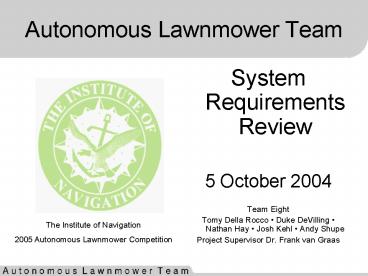Autonomous Lawnmower Team - PowerPoint PPT Presentation
1 / 23
Title:
Autonomous Lawnmower Team
Description:
Cover must not cause lawnmower components to overheat. Project Objectives. Goal: ... 2) Must not cause internal components to overheat. Any Questions? ... – PowerPoint PPT presentation
Number of Views:263
Avg rating:3.0/5.0
Title: Autonomous Lawnmower Team
1
Autonomous Lawnmower Team
- System Requirements Review
- 5 October 2004
- Team Eight
- Tomy Della Rocco Duke DeVilling Nathan Hay
Josh Kehl Andy Shupe - Project Supervisor Dr. Frank van Graas
The Institute of Navigation 2005 Autonomous
Lawnmower Competition
2
Needs and Goals
- Need
- The existing lawnmower does not meet guidelines
for the 2005 Autonomous Lawnmower Competition. - Goals
- Improve existing lawnmower to integrate GPS with
low level controller, design drive train feedback
method, recognize and avoid obstacles, operate in
all weather conditions, and improve remote
emergency stop capability.
3
Project Objectives
- Goal
- Integrate GPS with low level controller
- Objectives
- Keep lawnmower within 2 cm of the desired path
4
Project Objectives
- Goal
- Design drive train feedback method
- Objectives
- Use encoder to give feedback to motor controller
with 5 degree accuracy - Encoder must have standard interface
5
Project Objectives
- Goal
- Recognize and avoid obstacles
- Objectives
- Use sensor to detect obstacles
- Use sensor data to re-plan optimal path around
obstacles
6
Project Objectives
- Goal
- Operate in all weather conditions
- Objectives
- Design cover to shield lawnmower from elements
- Cover must be lightweight
- Cover must be easily removable
- Cover must not cause lawnmower components to
overheat
7
Project Objectives
- Goal
- Improve remote emergency stop capability
- Objectives
- Lawnmower drive train must stop if remote
emergency stop transmitter is out of range
8
Functional Flow Diagram - Level 1
1.Enter GPS coordinates
2.Generate and download calculated path
3.Execute path
4. Detect obstacles (Detect Obstacles?)
No
5. Alter path around obstacle using algorithms
Yes
7. Shut down and await new coordinates
6. Check for End coordinates
Yes
No
9
Functional Flow Diagram - Level 2
1.Enter GPS coordinates
To function 2
No
1.2 Contact officials
1.1 Obtain coordinates from competition
officials
Verify coor.
1.3 Load coordinates Into program
(To function 2)
Yes
10
Functional Flow Diagram - Level 2
2.Generate and download calculated path
To function 3
2.1 Program calculates path
2.2 File transfer to lawnmower processor
(To function 3)
11
Functional Flow Diagram - Level 2
To function 4
3.Execute path
3.1 Check progress and compare to
track coordinator
3.2 Compensate / control mower
(To function 4)
12
Functional Flow Diagram - Level 2
To function 5
4. Detect obstacles (Detect Obstacles?)
4.1 Activate sensor
4.2 Obtain sensor data
4.3 Process sensor data
(To function 5)
13
Functional Flow Diagram - Level 2
To function 6
5. Alter path around obstacle using algorithms
5.1 Re-plan / Modify path TBD
(To function 6)
14
Operational Requirements
- The lawnmower shall have a power life cycle of
one hour. - The Lawnmower shall operate under typical June
weather conditions.
15
Performance Requirements
- Lawnmower speed shall be capable of 10km/hr.
- Manual or wireless remote emergency stop shall
halt the lawnmower drive train within three
seconds and one meter of travel from time and
location of stop signal.
16
Constraints
- IEEE Divides Constraints into 8 Categories
- Economical
- Lawnmower production cost should not exceed
2000. - Lawnmower production should not have a negative
impact on the economy. - Manufacturability
- Manufactured lawnmower should not utilize
expensive and complex parts. - Lawnmower shall not exceed a length of 2m, a
width of 1.5m and a height of 1m. - Lawnmower shall not exceed a weight of 250 kg.
- Health and Safety
- Lawnmower speed shall not exceed a speed of 10
km/h. - Lawnmower shall not operate if it is out of
range.
17
Constraints
- IEEE Divides Constraints into 8 Categories
- Environmental
- Should not damage the environment via toxic, oil
spills, ect. - Should not fail due to rain, hail, heat, or any
normal weather. - Political TBD
- Social TBD
- Ethical TBD
- Sustainability - TBD
18
House of Quality
19
Object Sensor Trade Study
- The performance of the sensor will have many
impacts to the lawnmower - Overall time in cutting entire field
- Amount of grass left uncut near an object
- Cost
- Complexity
- This trade study will be done to understand how
different sensors affect each of the items above.
20
Object Sensor Trade Study
- This trade study will evaluate the following
sensors - Laser
- Acoustic
- Infrared
- Video
- Requirements and constraints
- 1) Must detect objects no less than 2 meters in
front of lawnmower - 2) Must be able to operate in dirty environments
- 3) Must be weather resistant
21
All-Weather Cover Trade Study
- The performance of the cover will have many
impacts to the lawnmower - Overall weight of the lawnmower
- Heat dissipation of the lawnmower and internal
components - Overall cost of the system
- Durability of the lawnmower against damage
22
All-Weather Cover Trade Study
- This trade study will evaluate the following
cover materials - Carbon-Fiber
- Metal
- Plastic
- Requirements and constraints
- 1) Limit the intrusion of moisture onto internal
components - 2) Must not cause internal components to overheat
23
Any Questions?































